 A reader has asked me to look into the theory that the movie industry uses certain months of the year to release bad or unwanted movies. The so-called Hollywood ‘dump months‘ are January and February, with some commentators also including August and September in the classification.
A reader has asked me to look into the theory that the movie industry uses certain months of the year to release bad or unwanted movies. The so-called Hollywood ‘dump months‘ are January and February, with some commentators also including August and September in the classification.
I looked at the movies US cinemas released over a five-year period (2011-15) to see what evidence we can find either for or against the theory.
Why ‘dump’ a movie at all?
Releasing a film in cinemas is pretty expensive and the marketplace is extremely crowded, so one may ask why studios release movies they don’t believe in. There can be a number of reasons but the two biggest ones are both contractual…
 The Studio has legally committed to releasing the movie in cinemas for a certain period of time. Either A list stars or financial investors are the most likely candidates to have demanded this is written into their contracts. When they joined the project, they may have required the Studio to commit to a certain release pattern, to ensure that the studios can’t just dump the film out on DVD or VOD and bypass the expensive process of theatrical distribution.
The Studio has legally committed to releasing the movie in cinemas for a certain period of time. Either A list stars or financial investors are the most likely candidates to have demanded this is written into their contracts. When they joined the project, they may have required the Studio to commit to a certain release pattern, to ensure that the studios can’t just dump the film out on DVD or VOD and bypass the expensive process of theatrical distribution.- The distributor wants to activate an ‘Output deal’. These are long-term arrangements between movie distributors and television broadcasters (and increasingly with VOD platforms, too). The two companies have agreed that the broadcaster will pay a fixed fee (i.e. $1 million) for the television rights to every movie theatrically released by the distributor, either for a set period of time (i.e. a five year deal) or for a set number of titles (i.e. the next fifty movies they release). ‘Output deals’ benefit the broadcaster because they can ensure they have a steady stream of content to show on their network (which their rivals cannot have) and the distributor benefits by ensuring every one of their films brings in at least some money, thereby making the release of each movie slightly less risky. In 2007, the American network ABC decided to massively reduce the number of movies they screened, but unfortunately they were still locked into an output deal with DreamWorks. This meant they were obliged to pay for the broadcast rights to a bunch of movies they were unlikely to ever actually screen, including ‘Biker Boyz’, ‘The Island’ and ‘Match Point’.
Whatever the reason for the release, this means that every year the Studios end up with a number of films they don’t think will do well enough to justify a big release but which they are still obligated to release. From a data point of view, it’s not possible to mark the ‘legally obligated releases’ out from the normal releases. However, we can look for patterns within the release data which suggest that there are ‘dump months’.
During which months are the most movies released?
Let’s first look at the number of releases. September was by far and away the busiest month, with an average of 40 movies being released each September. The quietest months were June and November, with an average of just 14 releases each.
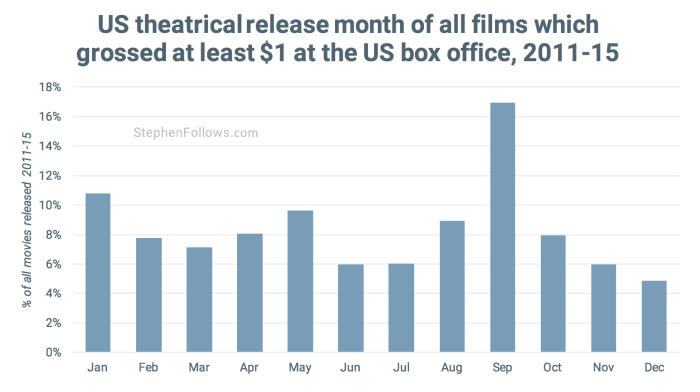
This supports the Hollywood ‘dump month’ theory as over-saturation of releases in any given month can only be detrimental to all but the biggest films.
When are the best films released?
The average IMDb rating for all the films I studied was 6.4 out of 10. By looking at the highest and lowest rated films, we can see when the ‘best’ and ‘worst’ films are released. I’ve defined the ‘best’ films as those with IMDb user ratings within the top 10% of films, which in practice means films with an IMDb score of 7.5 or higher. By this measure, the best films are released in December, May and September.
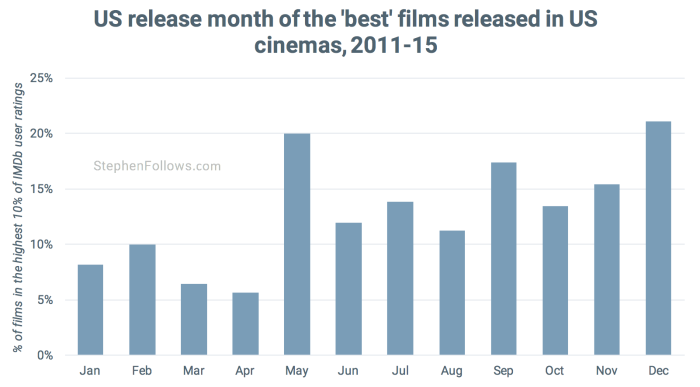
This is due in large part to the effect of the Academy Awards (aka the Oscars). In order for a film to be considered for the 2016 Oscars, it needs to have been on general release before 31st December 2015. Studios want to have their best films in the forefront of Oscar members’ minds when they are considering who to vote for in January. This means that a large number of Oscar-nominated films are released at the end of the year.
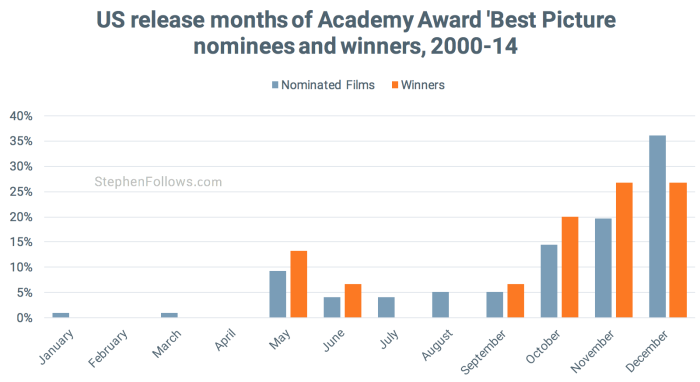
You can read more about Hollywood’s Oscar campaigns at stephenfollows.com/much-hollywood-campaigns-oscar-cost.
When are the worst films released?
Looking at the lowest scoring 10% of films (i.e. those with an IMDb user score of 5.1 or under) shows us that April is the poorest month for movies. This runs slightly counter to the ‘dump month’ theory that the worst films are released in January and February. In fact, of all twelve months, February has the lowest percentage of films in the bottom 10%: only 5 of the 80 films released in February 2011-2015 scored under 5.1 out of 10 on the IMDb user rating.
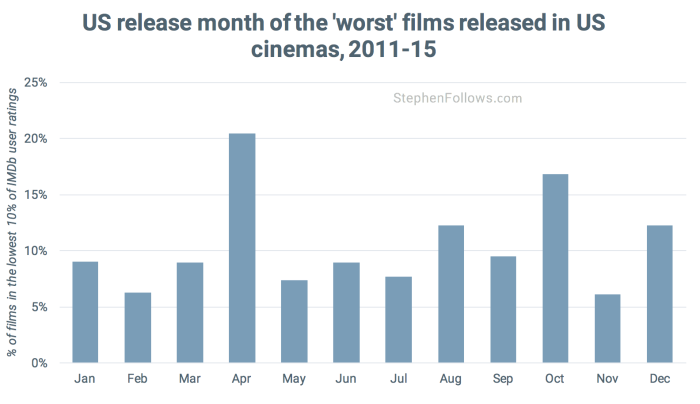
So we can conclude that while it’s certainly true that distributors ‘dump’ a disproportionately large number of releases in January and September, they’re not necessarily ‘the worst’ films of the year.
Notes on Hollywood ‘dump months’
Today’s dataset was made up of all films which were released in US cinemas between 1st January 2011 and 31st December 2015, and which grossed at least $1 at the US box office (according to IMDb’s Box Office figures). This came to 1,175 films in total.
As the film industry is global and complex, there is no such thing as one definite release date. So to find out a film’s release date you need to decide which of the following you want to measure…
- First ever screening to the public, often at a film festival.
- The first time it’s in commercial cinemas, anywhere in the world. This is often in its home country, although the best Hollywood blockbusters aim to go for the same release date across the world. I’ve previously studied this topic here stephenfollows.com/how-long-between-uk-us-movie-release-dates
- It’s first “wide” release, anywhere in the world. Some films will open on a limited release before later being available to all of the general public. This could be because the distributor is hoping that if a small number of people see the film early they will create a buzz for the general release (these screenings are called ‘Talkers’). Other films will open first in major cities, before having their run extended if the film performed well. And a fairly modern trend is Hollywood movies releasing major films a few days early on certain formats, such as IMAX or 70mm film prints (which happened recently with the release of The Hateful Eight).
- Its ‘limited’ or ‘wide’ release in a certain country.
For today’s research I opted to track the American ‘wide release’ date, because the US is the biggest movie market on the planet, major movies are most frequently released in the US first and because it’s the date most accurately tracked by IMDb and Wikipedia.
A small number of films will have widely different release dates depending on which criteria you use. For example, Youth was first shown to the public on 20th May 2015 in the Cannes film festival but it wasn’t until 4th December 2015 that it came out in the US. Cinemagoers in the UK had to wait until 26th January 2016 to get a chance to watch it, and poor Japanese movie buffs are still waiting (it’s scheduled for a release on 16th April 2016).

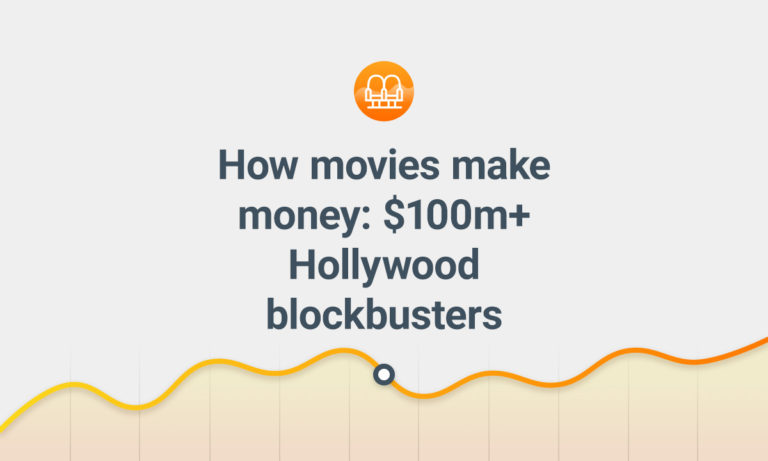
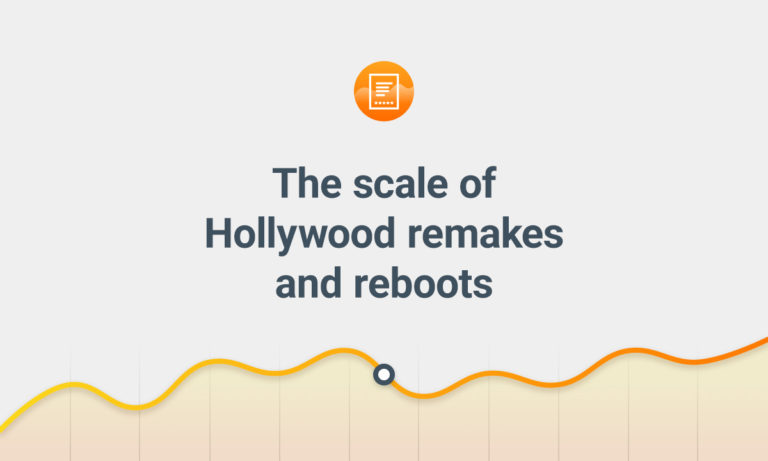


Comments
Few other things to factor in, September is big because DVD is historically where a lot of the margin is, so given a calendar financial year, you release September your DVD is out December, in time for Xmas.
Sept & Oct are also a dumping ground for anything too small to go in the summer, but not good enough to go into the awards corridor.
June & July are blockbuster months, if you want to get screens & get bang for your advertising buck you need to avoid those unless you are Marvel. Hence there is often a rush to get out in May. So June & July have less movies, but far bigger movies. Also a lot of theoretical tent poles that look bad get tossed in Mar-April. John Carter, Need For Speed, Gods of Egypt. You can’t throw those up against Jurassic World. That’s also why April is host to the worst.
Your articles are priceless..THANK YOU so much for taking the time to research and give such a comprehensive,to the point info that would be almost impossible for the up and coming indie filmmaker to put together without spending tons of time on top of everything else. Thank you..I am also reading everything else you post..D
Back in the days when I was still in Italy anything that came out in cinemas in July and August was either hopeless or the local Studios offices did not know how to sell it for the Italian market. I remember an idiosyncratic mix of the bonkers and the sublime.